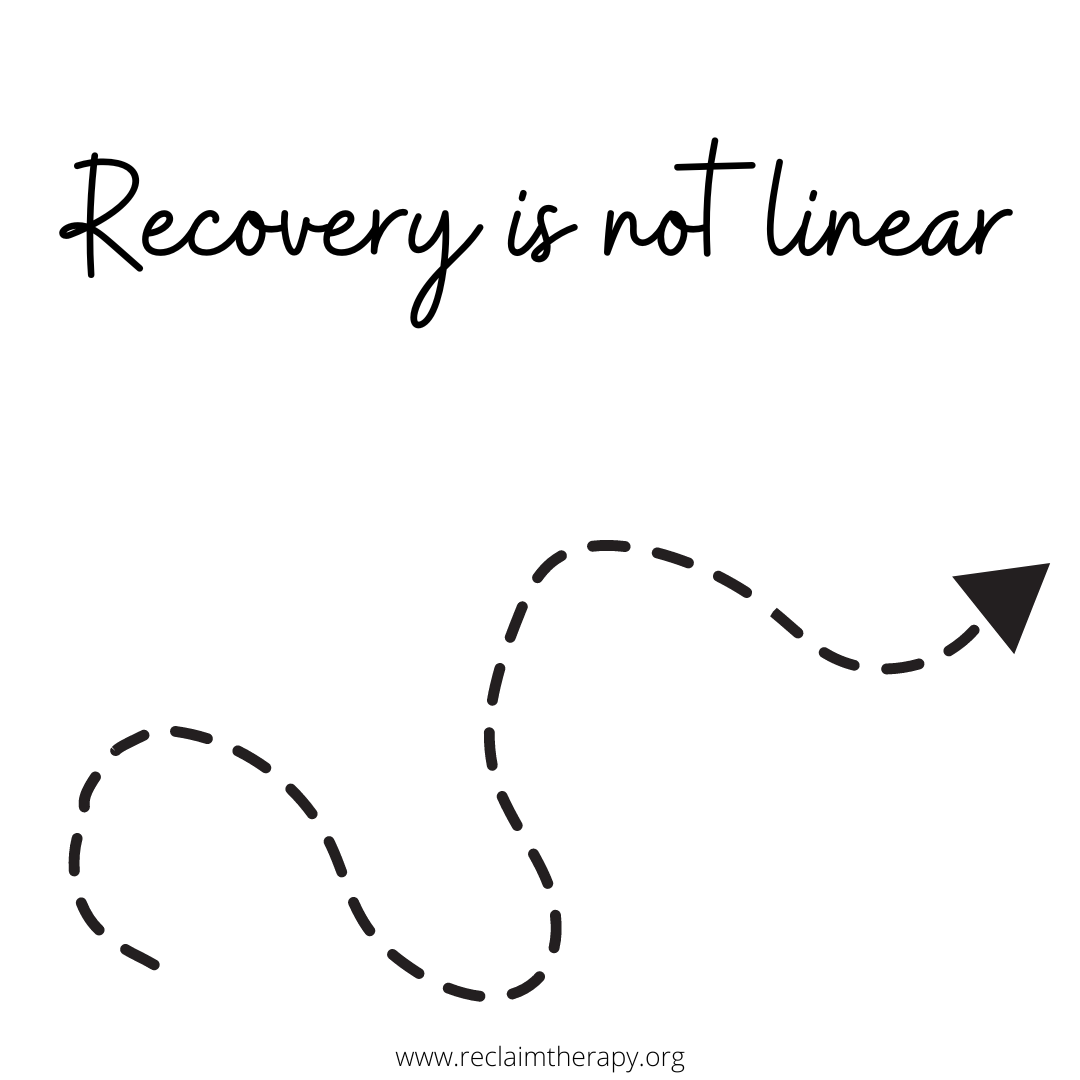How to Navigate Relapse in Eating Disorder Recovery
It feels cliche to say that eating disorder recovery isn’t linear… but it’s so true.
Recovery from your eating disorder will likely be anything but linear.
At times you probably feel like things are going ok, that things are feeling a bit lighter, less urgent, and a little less impulsive to dive headfirst into eating disorder urges.
And other days it probably feels like you’re at the bottom of an epically steep mountain that is recovery.
Relapses in eating disorder recovery happen.
And, they can be opportunities to grow in your recovery process.
What is an eating disorder relapse?
A relapse is an episode or a period of time that someone returns to eating disorder behaviors, body checking, obsession with body, weight and/or food.
Research has shown that 36% of women struggling with anorexia and 35% of women struggling with bulimia will relapse throughout the recovery process. Because there is often a significant amount of shame surrounding relapse, the actual percentages are likely higher due to underreporting.
How do you navigate relapses in eating disorder recovery?
Get honest with your treatment team.
It can be hard to be completely forthcoming with your treatment team, especially if you’re feeling some shame about returning to old behaviors. Here at Reclaim, we want you to know that there is nothing wrong with you returning to old ways of coping. You are not wrong, bad, or a failure.
We work hard to build relationships with our clients that are strong enough for honesty. Our job is to support you exactly where you are, whether that’s knee-deep in your eating disorder or navigating the world post-eating disorder.
If you have stopped working with a treatment team, now is a great time to reach out to your old team, or find a new team that can support you through this time.
Get curious about what might have triggered you.
The world that we live in is inherently triggering when it comes to food and body stuff. People who are navigating recovery from eating disorders are some of the strongest, most resilient people we know. And, being faced day in and day out with a culture obsessed with food rules, thinness, and dieting can be wearing.
Everyone’s triggers are going to be different. Some people get lured back to eating disorder thoughts and behaviors when they’re exposed to people in their lives dieting and losing weight. Some people return to eating disorder behaviors when they experience emotional upheaval or relationship changes. Other people return to eating disorder behaviors because it feels like the safest option to do so when so many things in life feel unsafe.
Regardless of what it is, being curious about what triggered you to return is important. With that information, you can begin to work with your treatment team on moving your way back to a steadier footing.
Get compassionate with yourself.
You’re a human. You’re not bad, wrong, a failure, or doing recovery wrong. Recognizing and affirming the pain and suffering that brought you back to your eating disorder will go a long way.
Get as much support as you can.
On top of working with your therapist and dietitian, groups are a wonderful way of connecting with other people who are experiencing similar struggles. There are multiple organizations that offer free support groups and meal support for people navigating eating disorder recovery that can be beneficial to add to your support network.
Prioritize your recovery
Recovering from an eating disorder can feel like a fight to reclaim your life. To reclaim you from the depths of obsession with food and body. If you’re here we’re sure you know that your eating disorder does a pretty great job of convincing you that recovery doesn’t need to be prioritized. But that healthiest, most centered Self that has fought so hard, to reclaim so much, is deserving recovery being the priority.
Understand that the very action of returning to recovery, is eating disorder recovery.
Here at Reclaim, we see recovery as the decision to come back. To come back to your values, to come back to your body, to come back to your hunger(s) and what you are most certainly deserving of.
Recovery doesn’t mean having it all figured out and never having another eating disorder thought or urge. Instead, recovery is turning toward yourself and your deepest needs and desires whenever you can.
If you’re struggling with a relapse, remember… there is always healing in the return.
🧡,
Reclaim Therapy is a specialized trauma and eating disorder therapy practice in Pennsylvania.
We provide in person and online therapy for eating disorders, trauma and body image concerns. We provide one on one counseling and group support for people who live in Pennsylvania who are struggling with anorexia, bulimia, binge eating disorder, orthorexia and compulsive exercise. We also specialize in treating PTSD and CPTSD (complex trauma). Click the button below to set up an appointment with a caring therapist today!




